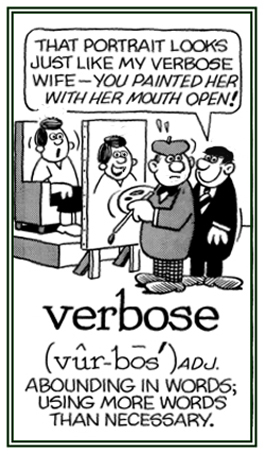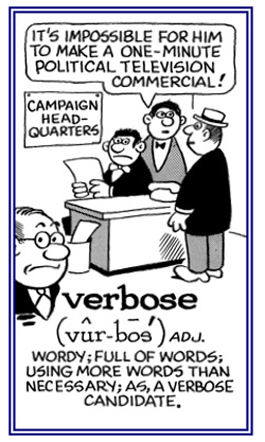verbo-, verb-, verbi-
(Latin: word, words)
1. A dislike of hearing certain words: James has a verbophobia that someone will criticize him for his politically positive opinions of President Trump.
2. Someone who is abnormally afraid to speak or who has an excessive hatred of speaking: Paul's verbophobia is based on the fact that he often stutters or stammers when he is trying to express himself.
2. Someone who is abnormally afraid to speak or who has an excessive hatred of speaking: Paul's verbophobia is based on the fact that he often stutters or stammers when he is trying to express himself.
verborrhea
An excessive flow of words.
verbose (adjective), more verbose, most verbose
1. A reference to a person or to something written which uses an excessive number of words, more than is necessary for clarity or precision: The speech Mr. Boredom gave to his business associates was quite repetitious, rambling, long-winded and verbose.

© ALL rights are reserved.

© ALL rights are reserved.
Go to this Word A Day Revisited Index
Jack went on and on about every little detail in a verbose way regarding how much he disliked the party he went to.
> 2. Etymology: from Latin verbosus, from verbum, "the word".

Go to this Word A Day Revisited Index
so you can see more of Mickey Bach's cartoons.
verbosely
In a verbose manner; wordy.
verboseness
The character or quality of being verbose; verbosity.
verbosity (s) (noun)
The state or quality of being verbose; superfluity of words; excessive wordiness, prolixity (wordy and tedious): "The readers thought he used too much verbosity in his article."
Verbum Domioni manet in aeternum. (Latin phrase)
The Word of the Lord endureth forever." [As seen in I Peter 1:25, of the Bible]: Verbum Domioni manet in aeternum is the motto of the Lutheran Reformation, which signified the end of the Middle Ages and the outset of the early period in Europe.
verbum sap
1. Verbum sapienti sat est (A word is enough for a wise man); popularly known as, "A word to the wise is sufficient".
2. An expression that nothing further needs to be said.
2. An expression that nothing further needs to be said.
Verbum sapienti sat est.
A word is enough for a wise man.
"A word to the wise is enough." A simple hint is sufficient for any intelligent person.
verve (s) (noun)
1. Vigor, energy, spirit, or enthusiasm; especially in the expression of artistic ideas.
2. Lively, vigorous spirit; vitality.
3. Etymology: "a special talent in writing"; from French verve, "enthusiasm"; especially, pertaining to the arts, in Old French "caprice, odd humor, proverb"; probably from Gallo-Romance verva, from Latin verba, "(whimsical) words", plural of verbum, "word".
2. Lively, vigorous spirit; vitality.
3. Etymology: "a special talent in writing"; from French verve, "enthusiasm"; especially, pertaining to the arts, in Old French "caprice, odd humor, proverb"; probably from Gallo-Romance verva, from Latin verba, "(whimsical) words", plural of verbum, "word".
Virtute non verbis.
By virtue, not by words.

